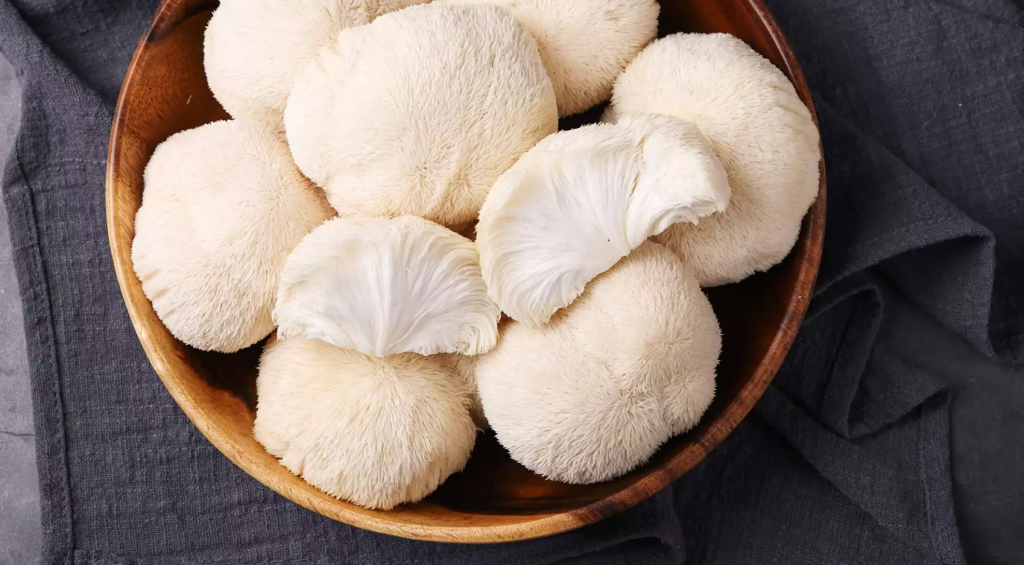Mushrooms are curious fungi that have some excellent health and anti-ageing benefits for humans that not all of us know how to take full advantage of.
Previously, we wrote about the Chaga mushroom, which has antioxidants, beta-glucans, and triterpenes that greatly help with anti-ageing, anti-inflammation, and maintaining a healthy heart.
We also wrote about the Reishi mushroom, which has the ability to stimulate brain neurons, search and destroy cancer cells, and prevent the development of new fat cells in obese individuals.
This time, we will look at the history and health benefits of the amazing Lion’s mane mushroom. There’s a lot to learn about this mushroom and there are also a few quirks to keep in mind when using it. So let’s get right to it!

What Is the Lion’s Mane Mushroom?
The Lion’s mane is a beautiful mushroom that looks incredibly fluffy because of the thousands of fibres that make up the structure of the mushroom. This mushroom is very distinct both in its appearance and in its medical uses.
Its appearance is one of a milky white color and a unique shape that is not common in the world of mushrooms. The Lion’s mane also has stems and caps that interlap with one another, making the appearance even more unique.
This mushroom grows naturally in many parts of the globe and is not as unique to a specific region as for example the Chaga mushroom. Over the past few years, this mushroom has grown in popularity and many farmers are cultivating the mushroom for worldwide use.
The Latin name of the Lion’s mane mushroom is Hericium, which means hedgehog and the name was given for to this mushroom for its spiky appearance. Some other names for this mushroom include the coral mushroom, hou you gu, and yamabushitake depending on the part of the world where the mushroom comes from.

Medicinally, Lion’s mane is used in the form of a tea, powder, tincture, or it can even be encapsulated. You can also eat this mushroom fresh and it is especially delicious is sauteed with some butter.
IMPORTANT: Never try to pick a mushroom on your own in the wild. Many mushrooms look alike and many more are poisonous. ONLY purchase mushrooms from supermarkets or an official health food store.
Lion’s Mane: Health Benefits

In terms of research, Lion’s mane is still new in the research world and there is much more to be discovered about this very peculiar mushroom.
The most common uses for the Lion’s mane mushroom are for cognitive performance and neurological health. There is also some research that suggest an improvement in:
- Digestive issues
- Antifungal activity
- Immune system health
- Blood sugar stabilization
- Anti-inflammatory properties
- Respiratory disease
- Supporting health cholesterol and blood pressure levels
- Encouraging healthy wound healing
- Preventing various chronic diseases
Because the main focus of the Lion’s mane mushroom is on mental health, there is also scientific research that suggest your mood could greatly be improved if you eat this mushroom regularly.
In general, this mushroom is safe for use and doesn’t have any side effects. However, if you have ever experienced an allergic reaction to mushrooms then you should certainly use this mushroom with great caution.
1. Nerve Growth and Repair
Some research has shown that Lion’s mane is helpful for nerve growth and differentiation in humans. Other studies have also shown that this mushroom is beneficial in diabetic neuropathy. In order for the full effect to be available this mushroom needs to be eaten regularly.
2. Alzheimer’s Disease
Although there is still no cure for Alzheimer’s Disease, there are steps that can be taken to slow down the process of this disease developing or spreading. Lion’s mane has been shown to help reduce damage to neurons cause by the amyloid-beta protein, which is a major cause of Alzheimer’s Disease. This is mostly due to the antioxidant and neuroprotective properties of this mushroom.
3. Sleep and Mood Disorders
This is the area where the Lion’s mane mushroom truly shines. There is plenty of scientific research that has shown Lion’s mane being helpful in treating mood disorders. This is mostly because this mushroom is capable of improving overall neurological health and also has antioxidant properties that help to remove toxins that are sometimes associated with mood disorders. This mushroom should not be the only medicine for mental health, but it can certain provide additional healing properties.
4. Seizure Disorders
Some research has shown that the Hericium Erinaceus variety of the Lion’s mane mushroom may prevent damage to the nerves caused after a seizure. Although more studies need to be done on humans to confirm this discovery, it is certainly helpful to know about the potential health effects of this mushroom.
5. Stroke Recovery and Prevention
The Lion’s mane mushroom can help prevent damage to the brain due to oxygen deprivation, which is something that happens in the circumstances of a stroke. However, as with the previous health benefits, this mushroom would need to become a regular part of your diet in order to provide its full health benefits.
6. Cognitive Function
Studies have shown that consuming Lion’s mane may help prevent spatial and visual memory problems. However, a Japanese study found that once you no longer consume this mushroom, the health benefits will slowly wear off and no longer work.
7. Stomach and Intestinal Health
In traditional indigineous use of the Lion’s mane it was used for healing intestinal ulcers. Although we now have medicine that deals with ulcers, the Lion’s mane can still provide additional medical support for this condition.
8. Inflammation
Inflammation is one of the main underlying causes of problems such as chronic diseases. Research has shown that Lion’s mane promises to greatly help with inflammation in all areas of the body. In particular, Lion’s mane is excellent for reducing inflammation that results from obesity.
9. Diabetes
Because Lion’s mane has the ability to stabilize blood sugar, it is an excellent diet addition for people who suffer from diabetes. It can also lower cholesterol and inflammation, which helps to prevent the development and spreading of other chronic diseases.
10. Benefits the Immune System
Lion’s mane has the ability to stimulate gut microbiota and activate intestinal immunity. Good intestinal immunity also means that it can help the overall immunity of the entire body. Some other research has shown that Lion’s mane stimulates immunity-specific white blood cells and helps them function properly.
Conclusion
The Lion’s mane has grown in popularity a lot over the past few years. It can help to prevent issues with numerous disorders including those related to the nervous system and cognitive function.
Like ther mushrooms, it can also provide support for issues such as immune support, anti-inflammation, and general health.
Always read the instructions about how much you should consume this mushroom in one of its many forms and consult your doctor if you have further questions or concerns.
